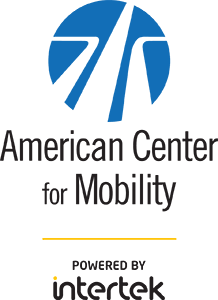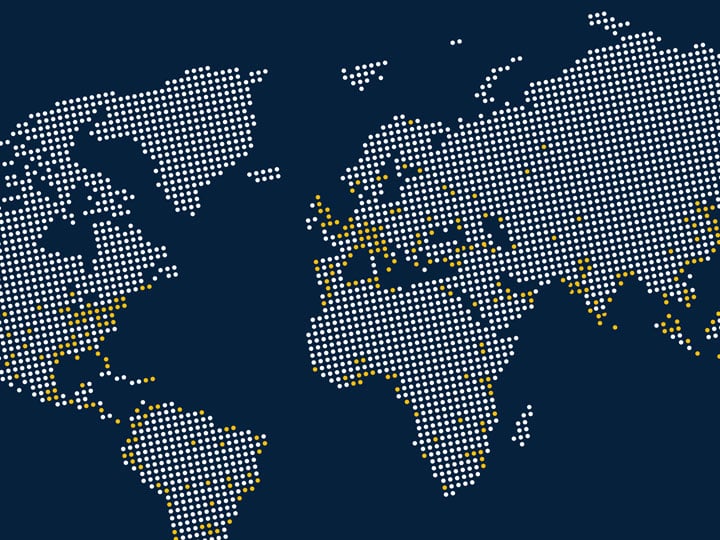American Center for Mobility powered by Intertek
The American Center for Mobility powered by Intertek is designed specifically to accelerate the development of automated and connected vehicle technologies. Located in Ypsilanti, MI, ACM is a test track designed and built for the development and validation of connected vehicle technologies. These technologies include Advanced Driver Assistance Systems (ADAS), Vehicle-to-vehicle (V2V) and Vehicle-to-infrastructure (V2I) communications, and advanced behaviors at all levels of SAE autonomy per SAE J3016.

Current ACM Site Features and Capabilities
ACM Freeway Loop
- 2.5 mile loop, unidirectional, two – three lanes
- Lay-by (pull-off) areas with power, Wi-Fi, and ethernet (fiber) available
- Speeds vary between 50 – 65 MPH, based on road geometry and DOT standard formulae with higher speed tests evaluated on a case-by-case basis
- Mixture of new pavement and weathered, existing pavement from a previously public portion of US-12
- Concrete and HMA materials
- Multiple merge opportunities
- Exit and entrance ramps with various configurations and changing elevations
- Two tri-level overpasses
- Varying shoulder widths and line striping configurations
- Road curvature and elevation changes limit line of sight and challenge long ranger sensors
- Roadside units and DSRC capability
- Environment useful for evaluating:
- Curve speed warning systems
- Lane keeping assistance systems
- Adaptive Cruise Control systems
- Lane departure warning systems
- Lane change decision aid systems
- Full speed range adaptive cruise control
- Custom applications
Willow Run Bypass Tunnel
- 700-feet long, unidirectional curved tunnel, two lanes, 40 MPH
- Entirely new HMA pavement
- Exit not visible until nearly halfway through tunnel
- Environment useful for evaluating:
- Communication / GPS signal loss
- Sudden changes in ambient lighting
- Curve speed warning systems
- Lane keeping assistance systems
- Adaptive Cruise Control systems
- Localization and lane keeping
- Lane change decision aid systems
- Other custom testing
Planet M Boulevard
- Six lanes, three eastbound, three westbound, 55 MPH straight road
- Entirely new HMA pavement
- Traffic signals and RSUs at freeway exit and entrance
- Transitions to six lanes with no boulevard
- Environment useful for evaluating:
- Lane keeping assistance systems
- Adaptive Cruise Control systems
- Forward vehicle collision warning systems
- Assisted parking systems
- Lane departure warning systems
- Lane change decision aid systems
- Maneuvering Aids for Low Speed Operation systems
- Pedestrian detection and collision mitigation systems
- Low speed following systems
- Full speed range adaptive cruise control systems
- Forward vehicle collision mitigation systems
- Cooperative intersection signal information and violation warning systems
- Other custom testing
Urban Arterial
- 1.5-miles long, two lanes, bidirectional, 55 mph
- Lay-by (pull-off) areas with power, Wi-Fi, and ethernet (fiber) available
- 11-foot lanes with narrow eastbound shoulders
- Existing, weathered pavement from previously public portion of US-12
- Environment useful for evaluating:
- Lane keeping assistance systems
- Adaptive Cruise Control systems
- Forward vehicle collision warning systems
- Assisted parking systems
- Lane departure warning systems
- Maneuvering Aids for Low Speed Operation systems
- Low speed following systems
- Full speed range adaptive cruise control systems
- Forward vehicle collision mitigation systems
- Overtaking
- Other custom testing
Roadside Units
- RSU’s located throughout the different testing environments for standard and custom DSRC applications
Equipment
- DRI Soft Car 360 Global Vehicle Target
- Euro NCAP Vehicle Target (EVT)
- 4activePS Static Adult and Child pedestrian targets and surfboards
- Moshon Data Foam Core Vehicle Target
- Moshon Data Foam Slab Vehicle Target
- RaceLogic VBOX ADAS Data Acquisition and RTK System
Intertek can evaluate and benchmark Advanced Driver Assistance and Safety Systems (ADAS) such as:
- Adaptive Cruise Control (ACC)
- Automatic Emergency Braking (AEB)
- Automatic Parking
- Automotive Navigation System
- Blind Spot Monitoring
- Crash Imminent Braking (CIB)
- Collision Avoidance System
- Driver Monitoring System
- Forward Collision Warning (FCW)
- Lane Departure Warning System (LDWS)
- Lane Keep Assist System (LKAS)
- Traffic Sign Recognition
- Turning Assistant
- Vulnerable Road User (VRU) Detection System
Standards we evaluate against:
- Euro NCAP Test Protocol – Autonomous Emergency Braking Car-to-Car
- Euro NCAP Test Protocol – Autonomous Emergency Braking Vulnerable Road User
- Euro NCAP Test Protocol – Lane Support Systems
- Euro NCAP Test Protocol – Speed Assist Systems
- ISO 11067:2015 – Curve speed warning systems (CSWS)
- ISO 11270:2014 – Lane keeping assistance systems (LKAS)
- ISO 15622:2010 – Adaptive Cruise Control systems
- ISO 15623:2013 – Forward vehicle collision warning systems
- ISO 16787:2017 – Assisted parking system (APS)
- ISO 17361:2017 – Lane departure warning systems
- ISO 17386:2010 – Maneuvering Aids for Low Speed Operation (MALSO)
- ISO 17387:2008 – Lane change decision aid systems (LCDAS)
- ISO 19237:2017 – Pedestrian detection and collision mitigation systems
- ISO 22178:2009 – Low speed following (LSF) systems
- ISO 22179:2009 – Full speed range adaptive cruise control (FSRA) systems
- ISO 22839:2013 – Forward vehicle collision mitigation systems
- ISO 26684:2015 – Cooperative intersection signal information and violation warning systems (CIWS)
Intertek offers a wide range of engineering support services at all phases of product evaluation, such as:
- Product design troubleshooting & recommendations
- R&D support
- Identify/solve regulatory & certification requirements
- Identify/solve testing challenges
- Performance & safety assessments
- Systems plan development, including analysis on integrated components
- Assistance with documentation
- New technology requirements
- New automotive market demand
- Simplifying complex requirements
- Design for compliance with current/upcoming regulations
- Resolve existing issues and anticipate future challenges
Intertek can perform full vehicle evaluation and validation processes including:
- Accelerated Mileage Accumulation
- Data Acquisition and Comprehensive Reporting
- Energy Storage System Cycling and Performance Measurement
- EV Infrastructure Testing
- Fleet Vehicle Monitoring
- Public Road & Closed Track Testing
- Rough Road Testing
- Evaluate Interoperability between Devices and Vehicles
- Dedicated Short Range Communications (DSRC) V2X
- 5G communications V2X
- Sensor Durability
Additional Capabilities:
- Full Vehicle Testing including real-world and test track mileage accumulation
- Access to fleet operators and contracted drivers to allow for rapid mileage accumulation and real-world performance assessment
- Multi-channel data logging capabilities with real-time data upload via LTE/4G/Wi-Fi networks
- Battery pack cycling/testing
- Battery Testing
- Vehicle Powertrain Component Testing
- Electric Vehicle Supply Equipment Testing
- Closed Track Vehicle Testing
- Public Road Vehicle Testing
- Laboratory Vehicle Testing
Related Links

